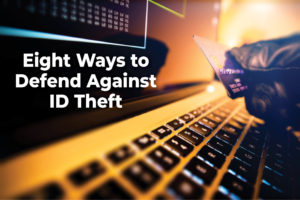 Everyday actions such as throwing old bills in the trash or providing financial information over the phone might seem harmless, but all these events can lead to identity theft. It’s a crime that’s occurring with increasing frequency.
Everyday actions such as throwing old bills in the trash or providing financial information over the phone might seem harmless, but all these events can lead to identity theft. It’s a crime that’s occurring with increasing frequency.
ID theft now tops the list of complaints received by the Federal Trade Commission. For its victims, it can have distressing, serious consequences.
The goal of identity thieves is to gather your personal information – and use it for their personal gain. For instance, they might open a bank account in your name and then write bad checks; clone your debit card and drain your bank account or give your name to the police during an arrest.
Identity thieves use different tactics to get what they’re after including:
- Dumpster Diving – Go through trash looking for bills or other papers containing personal info
- Skimming – Using a special device, they steal credit or debit card numbers when your card is processed
- Phishing – Pretend to be a financial institution or government agency and ask for information through email or pop-up messages
- Hacking – They hack into your email or online accounts to get to stored data
- Stealing – They snatch wallets, purses or mail or take tax or personnel records from a home or business
Here are eight steps you can start taking now to make ID security a priority and a practice.
- Remove your Social Security card from your wallet. Store it in a secure place.
- Change weak passwords. The strongest passwords combine upper and lowercase letters, numbers and special characters.
- Make sure your home Wi-Fi network is password protected.
- Don’t click on links in unsolicited emails. Don’t give out information over the phone or online unless you’ve verified the source. A website is secure if “https” is in the online address.
- Keep your eye on debit and credit cards when paying for purchases.
- Shred all paperwork with personal information before disposing of it.
- Review bills and bank statements carefully for unusual transactions. If you identify unusual transactions contact your financial institution immediately.
- Be sure to review your credit report regularly. This can help you recognize if your identity has been stolen. You can do this by visiting: annualcreditreport.com




